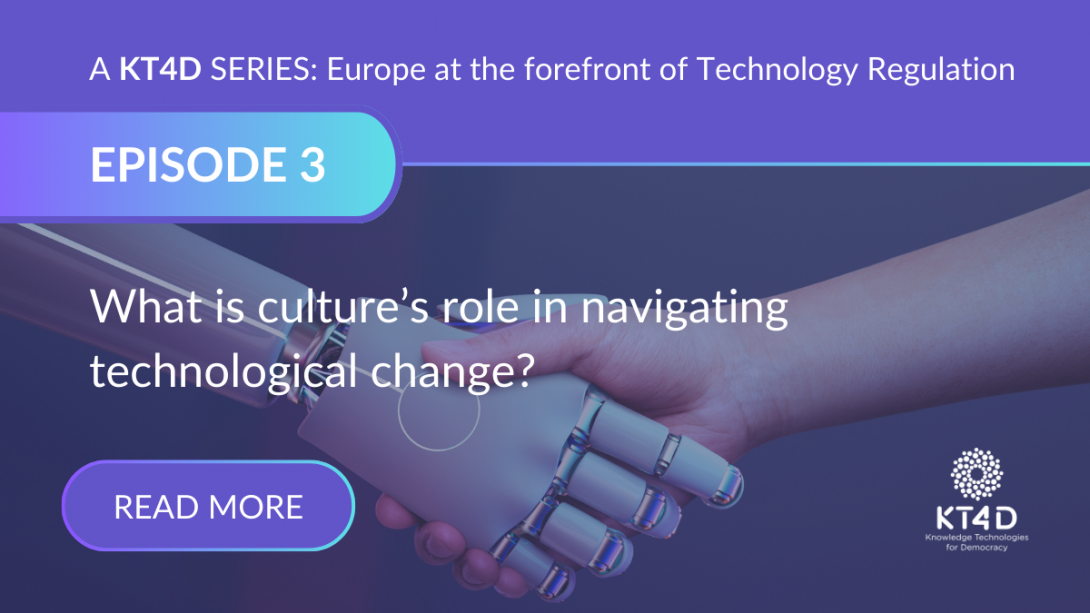What is culture’s role in navigating technological change?
8, April, 2024

Author: Matilde Castleberry
In the previous episode of the KT4D series focusing on Europe’s commitment in regulating technology, we analysed and dived into the AI Act, with particular attention to risk assessment. In response to the recent regulation, a group of experts coming from the KT4D Consortium wrote a Policy Brief entitled ‘Culture’s role in Navigating Technological Change: The KT4D Perspective on recent developments in European regulation’ - stressing the importance of culture in growing a deeper understanding of societal responses to AI development.
In this article we will be discussing the relationship between culture and technological change and will finally showcase KT4D’s stand on the future steps that should be taken to steer policymaking in a different direction.
Cultures and Technological change - Shaping a global culture?
We have explored the relationship of democracy and technology with information, and of AI with democracy in our first episode, but have never yet tackled the relevance of culture. It can be complicated to picture how technological changes influence culture, therefore studying historical events like Globalisation helps illuminate the intricate relationship between the two.
The advent of technological inventions such as cars, planes or bullet trains, has revolutionised the way in which people and goods move around the world changing the demographic and economic outlook of our world. However Globalisation does not solely refer to the international movement of physical objects, it also and greatly, refers to the movement of information. It is needless to say how the internet has revolutionised the way in which we access and process data, allowing us to obtain any kind of information on someone or something on the opposite side of the world, in seconds.
Just as the information we process formulates our critical thought, and consequently our decision making, it also changes the way we shape our cultural beliefs and norms. Technological advancements have significantly transformed the cultures of many regions worldwide, both by assimilating elements from them and contributing new ones. Human rights - which in certain parts of the world are considered as ‘given’, therefore as an integral part of individuals and of societies - were able to reach new populations thanks to advancements in information technologies.
Some sociologists talk about the emergence of a global culture. Popular information platforms and social media networks are widely accessible globally, enabling younger generations to share their music preferences, movie interests, and personal challenges with peers from across the globe. This possibility was never given to any previous generation and the results of this interconnection and of a possible shared system of values, will have unforeseen consequences.
Why and how to evaluate cultural risks
Since culture is influenced by information, it should be a prerogative of policymakers to tackle the risks related to culture as a collective and social issue to be addressed by regulations. In its Policy Brief KT4D has identified a number of cultural blindspots in the current regulatory discourse. Culture plays a significant role in discussions about AI and Big Data, yet the Act mainly refers to vague 'Union values,' which might overlook broader European cultural values. Concepts like trust, responsibility, and personal freedoms vary across cultures, but the Act doesn't adequately address these differences. It seems to confuse values with ethics and overlooks the broader impact of cultural diversity.
Answering these blindspots, KT4D proposed the creation of an inverted form of the risk pyramid - proposed by the European Union - which focuses on integrating culture-led perspectives in AI policy that can consider cultural identity, values, and civic engagement in governance. The implication is that safety considerations regarding AI should broaden their scope beyond immediate physical dangers to also include long-term impacts on societal norms and democratic procedures.
The interplay between culture and technological advancement underscores the need for policymakers to address cultural risks in AI regulation. By integrating culture-led perspectives into policy frameworks, we can better safeguard cultural diversity and values amidst technological change. It is imperative that we adopt a holistic approach to evaluating and mitigating these risks, ensuring inclusivity and the preservation of cultural heritage in the face of innovation.
Thank you for following this KT4D series till here. If you wish to stay up to date with our latest news and events and to read our latest publications, subscribe to our newsletter here.